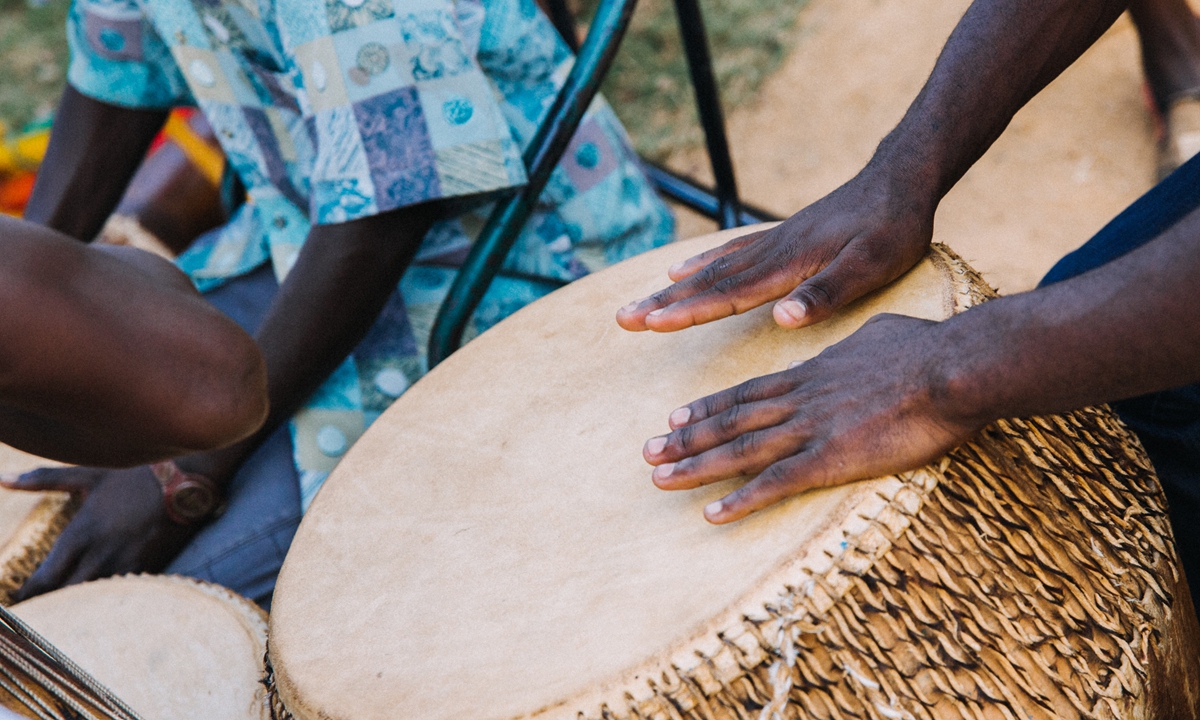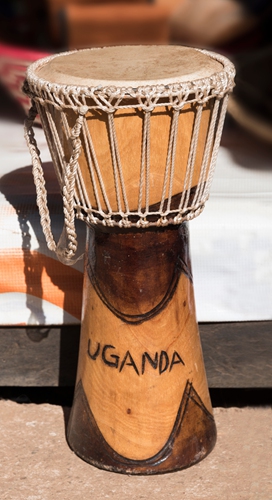ARTS / CULTURE & LEISURE
Centuries-old tradition of drum making in Uganda battling modernity
Changing beat

Drummers play the drums. Photo: IC

A drum marked with the country's name Uganda Photo: IC
Uganda is a country in the East African region with a rich diversity of cultures passed onto generations through oral storytelling and practice.
A drum is one of the must-haves in communication for villagers in the traditional African setting. When village authorities use drums to pass on messages, residents have to listen carefully. It was also a key musical instrument in times of sorrow, a bad crop harvest, or in times of happiness, like enthroning a new king.
Drums are now quickly being replaced by other forms of communication, putting the traditional drum-making skill on a collision course with modernity.
Birthplace of drums
Mpambire, a village in the central Ugandan district of Mpigi, is known as the birthplace for drums in the country. The village is dotted with makeshift workshops where the drums are made from tree trunks and animal hides and skins. The trunks are cut from nearby forests that are now being quickly replaced by gardens and settlements of an expanding population.
Francis Yiga, an artisan in the village, told the Xinhua News Agency in a recent interview that the drum-making skill is usually passed on from grandparents or parents to their children. He said it is a special skill that takes time to learn.
"I started learning how to make drums when I was still in school. When I used to come back from school, I joined my grandfather to help him. There was also financial gain so I was attracted to drum making," Yiga said.
"We have been getting some training and we are planting our trees although they take longer to grow. We also go to other places in the country to get the trunks, especially in areas where they don't know their use."
Depending on the size of the drum and customer needs, the crafting takes up to six months for it to be displayed for sale, said Fred Mwanjje, Yiga's neighbor who is also an artisan. Mwanjje said there are clients who make special orders, meaning that you have to make several sets with specific tones.
Both Mwanjje and Yiga believe that the good old times are gone after the advent of modern musical instruments like electric pianos, guitars, modern drums, declaring that their livelihoods are being threatened by modernism.
"We have faced a lot of challenges because of the electric musical instruments. We do not make many sales as we used to do. For instance, in schools, churches we used to sell to them drums but now they are buying pianos. This is killing our business. In the old days, people used to buy drums to play at weddings but these days they hire public address sound systems," said Yiga.
Experts agree with the artisans, saying that embracing modernism without assessing its negative impact on African cultural values is a danger.
Sam Okello, chairperson of the board of trustees of Uganda National Cultural Center, a state-run institution charged with the promotion of culture, told Xinhua in a recent interview that although modernity is good, it can also be negatively disruptive, especially among young people who may adopt it, forgetting their traditional values. He insisted that nations grow based on their cultural values.
Yiga said that although modernism has posed threats to the existence of the drum, it will be difficult to wipe the drums away because there are locals who still cherish their culture.
"For people who appreciate drums, they will continue buying them because for instance in schools, there will be a time for cultural performances, you cannot use a piano but a drum," he said.
COVID-19 impact
The outbreak of the COVID-19 pandemic in 2020 worsened an already precarious situation, according to Mwanjje.
Schools, religious institutions and entertainment centers, which were the major clients, were all closed as the government imposed strict lockdown measures to control the spread of the pandemic. This meant that the artisans had to close shops.
"COVID-19 affected us a lot because all the places we were selling our products were closed, these include schools, religious institutions, tourists were not coming. Even gathering was not allowed," Mwanjje said.
Mwanjje, like most of his business colleagues, has a fear that most of their clients may have moved on, some with closed businesses. The artisans are now pinning their hope on the recently reopened economy, believing that business will go back to the pre-pandemic normal.
Music groups in Uganda are also starting to embrace the idea of playing traditional musical instruments together with modern electric instruments.
Some bands in Kampala, the Ugandan capital, are already combining traditional and modern musical instruments to bellow out African turns in the era of cultural globalization.
Besides looking at drums as musical instruments, Mwanjje and Yiga are devising means of marketing drums as decorations, toys for children and souvenirs for tourists.



